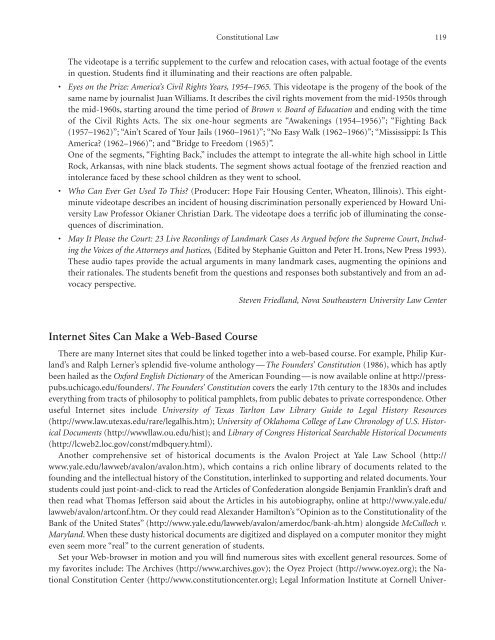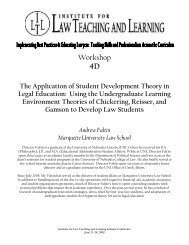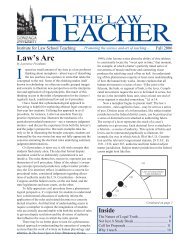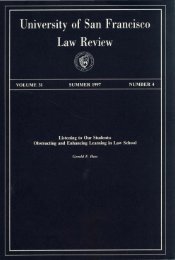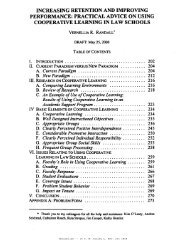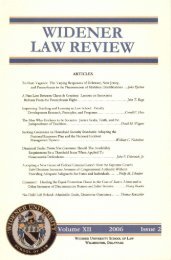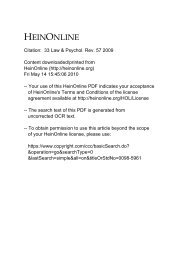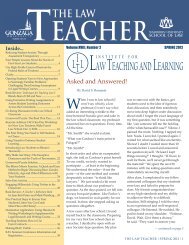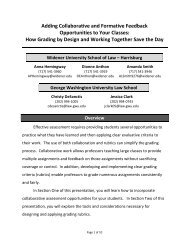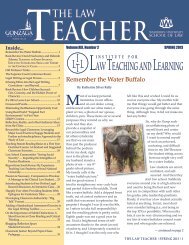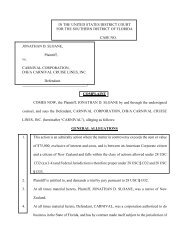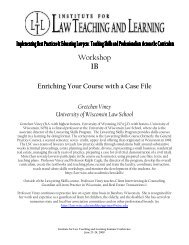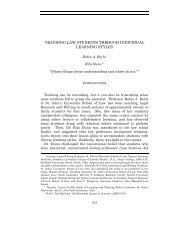Teaching the Law School Curriculum - Institute for Law Teaching ...
Teaching the Law School Curriculum - Institute for Law Teaching ...
Teaching the Law School Curriculum - Institute for Law Teaching ...
Create successful ePaper yourself
Turn your PDF publications into a flip-book with our unique Google optimized e-Paper software.
Constitutional <strong>Law</strong> 119<br />
The videotape is a terrific supplement to <strong>the</strong> curfew and relocation cases, with actual footage of <strong>the</strong> events<br />
in question. Students find it illuminating and <strong>the</strong>ir reactions are often palpable.<br />
• Eyes on <strong>the</strong> Prize: America’s Civil Rights Years, 1954–1965. This videotape is <strong>the</strong> progeny of <strong>the</strong> book of <strong>the</strong><br />
same name by journalist Juan Williams. It describes <strong>the</strong> civil rights movement from <strong>the</strong> mid-1950s through<br />
<strong>the</strong> mid-1960s, starting around <strong>the</strong> time period of Brown v. Board of Education and ending with <strong>the</strong> time<br />
of <strong>the</strong> Civil Rights Acts. The six one-hour segments are “Awakenings (1954–1956)”; “Fighting Back<br />
(1957–1962)”; “Ain’t Scared of Your Jails (1960–1961)”; “No Easy Walk (1962–1966)”; “Mississippi: Is This<br />
America? (1962–1966)”; and “Bridge to Freedom (1965)”.<br />
One of <strong>the</strong> segments, “Fighting Back,” includes <strong>the</strong> attempt to integrate <strong>the</strong> all-white high school in Little<br />
Rock, Arkansas, with nine black students. The segment shows actual footage of <strong>the</strong> frenzied reaction and<br />
intolerance faced by <strong>the</strong>se school children as <strong>the</strong>y went to school.<br />
• Who Can Ever Get Used To This? (Producer: Hope Fair Housing Center, Wheaton, Illinois). This eightminute<br />
videotape describes an incident of housing discrimination personally experienced by Howard University<br />
<strong>Law</strong> Professor Okianer Christian Dark. The videotape does a terrific job of illuminating <strong>the</strong> consequences<br />
of discrimination.<br />
• May It Please <strong>the</strong> Court: 23 Live Recordings of Landmark Cases As Argued be<strong>for</strong>e <strong>the</strong> Supreme Court, Including<br />
<strong>the</strong> Voices of <strong>the</strong> Attorneys and Justices, (Edited by Stephanie Guitton and Peter H. Irons, New Press 1993).<br />
These audio tapes provide <strong>the</strong> actual arguments in many landmark cases, augmenting <strong>the</strong> opinions and<br />
<strong>the</strong>ir rationales. The students benefit from <strong>the</strong> questions and responses both substantively and from an advocacy<br />
perspective.<br />
Internet Sites Can Make a Web-Based Course<br />
Steven Friedland, Nova Sou<strong>the</strong>astern University <strong>Law</strong> Center<br />
There are many Internet sites that could be linked toge<strong>the</strong>r into a web-based course. For example, Philip Kurland’s<br />
and Ralph Lerner’s splendid five-volume anthology — The Founders’ Constitution (1986), which has aptly<br />
been hailed as <strong>the</strong> Ox<strong>for</strong>d English Dictionary of <strong>the</strong> American Founding — is now available online at http://presspubs.uchicago.edu/founders/.<br />
The Founders’ Constitution covers <strong>the</strong> early 17th century to <strong>the</strong> 1830s and includes<br />
everything from tracts of philosophy to political pamphlets, from public debates to private correspondence. O<strong>the</strong>r<br />
useful Internet sites include University of Texas Tarlton <strong>Law</strong> Library Guide to Legal History Resources<br />
(http://www.law.utexas.edu/rare/legalhis.htm); University of Oklahoma College of <strong>Law</strong> Chronology of U.S. Historical<br />
Documents (http://wwwllaw.ou.edu/hist); and Library of Congress Historical Searchable Historical Documents<br />
(http://lcweb2.loc.gov/const/mdbquery.html).<br />
Ano<strong>the</strong>r comprehensive set of historical documents is <strong>the</strong> Avalon Project at Yale <strong>Law</strong> <strong>School</strong> (http://<br />
www.yale.edu/lawweb/avalon/avalon.htm), which contains a rich online library of documents related to <strong>the</strong><br />
founding and <strong>the</strong> intellectual history of <strong>the</strong> Constitution, interlinked to supporting and related documents. Your<br />
students could just point-and-click to read <strong>the</strong> Articles of Confederation alongside Benjamin Franklin’s draft and<br />
<strong>the</strong>n read what Thomas Jefferson said about <strong>the</strong> Articles in his autobiography, online at http://www.yale.edu/<br />
lawweb/avalon/artconf.htm. Or <strong>the</strong>y could read Alexander Hamilton’s “Opinion as to <strong>the</strong> Constitutionality of <strong>the</strong><br />
Bank of <strong>the</strong> United States” (http://www.yale.edu/lawweb/avalon/amerdoc/bank-ah.htm) alongside McCulloch v.<br />
Maryland. When <strong>the</strong>se dusty historical documents are digitized and displayed on a computer monitor <strong>the</strong>y might<br />
even seem more “real” to <strong>the</strong> current generation of students.<br />
Set your Web-browser in motion and you will find numerous sites with excellent general resources. Some of<br />
my favorites include: The Archives (http://www.archives.gov); <strong>the</strong> Oyez Project (http://www.oyez.org); <strong>the</strong> National<br />
Constitution Center (http://www.constitutioncenter.org); Legal In<strong>for</strong>mation <strong>Institute</strong> at Cornell Univer-


